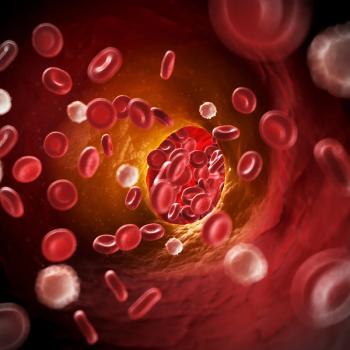
Drs Katie Tobon and Javier Pinilla-Ibarz explore the role of prognostic molecular testing in chronic lymphocytic leukemia and comment on challenges seen with referral patients that come from community practices.

Drs Katie Tobon and Javier Pinilla-Ibarz explore the role of prognostic molecular testing in chronic lymphocytic leukemia and comment on challenges seen with referral patients that come from community practices.

Pfizer and BioNTech are seeking an Emergency Use Authorization for their COVID-19 vaccine to include children 6 months through 4 years of age.

Stuart Staggs, senior director of strategic programs at McKesson, discussed the encouraging metrics associated with use of the Oncology Care Model (OCM) sponsored by the Centers for Medicare and Medicaid Services.

Ned Milenkovich, PharmD, JD, licensed pharmacist and principal at Much Law, PC, discusses the announcement of the Mark Cuban Cost Plus Drug Company, which will, in some cases, offer expensive medication at a drastically lower price without insurance.

Christopher Mast, MD, vice president of clinical informatics at Epic, explains his outlook for the future in the field of oncology in light of the ongoing delays in cancer screenings rates.

Christopher Mast, MD, vice president of clinical informatics at Epic, explains the level to which cancer screening rates would need to rise to meet pre-pandemic rates.

Christopher Mast, MD, vice president of clinical informatics at Epic, discusses research that showed that cancer screening rates in 2021 rebounded from the low rates at the start of the pandemic, but not significantly.

Stacy Miller, PharmD, BCPP, the senior content management consultant at Wolters Kluwer Health, discusses clinician search data focused on mental health treatment trends and needs.

Dr Anthony Perissinotti explains the new formulation of acalabrutinib for chronic lymphocytic leukemia presented at ASH 2021.

Dr Kirollos Hanna details clinical trial data on the use of zanubrutinib in treating chronic lymphocytic leukemia.

Lisa Nodzon, PhD, ARNP, AOCNP, and Javier Pinilla-Ibarz, MD, PhD, review challenges in CLL therapy, including cost barriers.

Pharmacists are essential team members for the education of patients with diabetes, especially around injection technique for patients using injectable medications, such as insulin.

Emily Kaine, MD, senior VP global health and manufacturing services at US Pharmacopeia (USP), discusses the work USP is engaged in to strengthen the global supply chain of quality-assured medicines and build manufacturing capabilities for new and innovative medicines.

Ashley Woodyard, a PharmD candidate at the Touro University California College of Pharmacy in Vallejo and co-author of an article in the January 2022 issue of Pharmacy Times®, discussed the article and the benefits of pharmacy technicians as vaccine administrators.

In The Legal Prescription series with Ned Milenkovich, we discuss a set of important topics in the pharmacy landscape.

Experts in gynecologic oncology provide insight on available patient assistance programs to help lower costs of PARP inhibitors for the treatment of ovarian cancer, and how pharmacists can aid in obtaining this information.

Anna Legreid Dopp, PharmD, the Senior Director of Clinical Guidelines & Quality Improvement at ASHP, and Bayli Larson, PharmD, the Strategic Initiatives Associate at ASHP, discuss the grant the ASHP received from the American Rescue Plan.

Abemaciclib (Verzenio) was recently approved in combination with endocrine therapy for the adjuvant treatment of adult patients with HR–positive, HER2-negative, node-positive, early breast cancer at high risk of recurrence.

Ron Lanton III, Esq, principal at Lanton Law, said entrepreneur Mark Cuban's new venture into the pharmacy field is very interesting, although it maybe just another player in the mail-order pharmacy market.

Shreejit Nair, senior vice president and life sciences market business lead at CitiusTech, discusses some trends and predictions for health care IT this year and on into the future.

Brian Thornley, the Associate Vice President of Supply Excellence, Innovation and Digital Strategy at Merck, discusses what makes blockchain unique and what it could mean down the road for pharmacies.

Mitchel Rothholz, RPh, MBA, chief of governance and state affiliates at the American Pharmacists Association (APhA) and executive director of the APhA Foundation, discusses the results of a nationwide survey of pharmacists during the ongoing pandemic.

Norman Lepor, MD, a cardiologist and clinical investigator in the phase 3 clinical program for inclisiran (Leqvio; Novartis), discusses major trends in the atherosclerotic cardiovascular disease and LDL-C management treatment landscape this year.

Key opinion leaders provide some advice for the public regarding COVID-19 booster shots and look to the future of the pandemic.

Drs Angela Rasmussen and Donald Alcendor detail the roadblocks facing COVID-19 booster shots.

Expert panel discusses the current state of the pharmacy technician role, how COVID-19 changed the perception of pharmacy technicians, and updates across the legislative and regulatory landscape for pharmacy technician–administered tests and vaccines.

Norman Lepor, MD, a cardiologist and clinical investigator in the phase 3 clinical program for inclisiran (Leqvio; Novartis), discusses projections for inclisiran’s use in clinical and pharmacy settings.

Having such a program spearheaded by pharmacists has helped show the public the vital roles that pharmacists play.

Kirollos Hanna, PharmD, BCPS, BCOP, discusses clinical trial data for second-generation BTK inhibitors for chronic lymphocytic leukemia.

Anthony Perissinotti, PharmD, BCOP, provides an overview of the available treatment options in chronic lymphocytic leukemia, highlighting the role of first-generation BTK inhibitors.